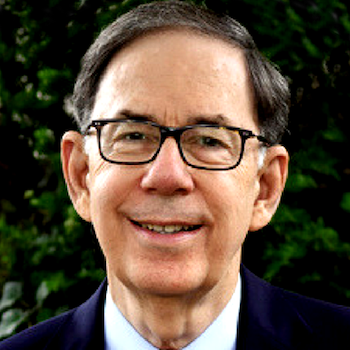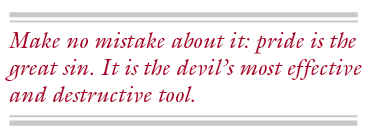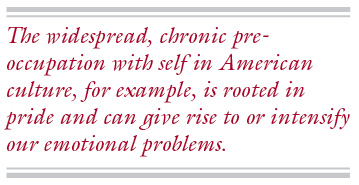Back to series


Pride and Humility
Click here to open a Print - Friendly PDF
“Pride is your greatest enemy, humility is your greatest friend.” So said the late John R.W. Stott, a remarkably humble man of great abilities and accomplishments who is often said to have made the greatest impact for Christ of anyone in the twentieth century. His succinct statement about pride and humility goes straight to the heart of what the Bible teaches about the deadly root of our sins and sorrows.
How many recent sermons have you heard on pride or humility? Probably not many. One hears surprisingly little from church or parachurch leaders about either of these subjects. In fact, what throughout history has been recognized as the deadliest of vices is now almost celebrated as a virtue in our culture. Pride and arrogance are conspicuous among the rich, the powerful, the successful, the famous, and celebrities of all sorts, and even some religious leaders.
And it is also alive and well in ordinary people, including each of us. Yet few of us realize how dangerous it is to our souls and how greatly it hinders our intimacy with God and love for others. Humility, on the other hand, is often seen as weakness, and few of us know much about it or pursue it. For the good of our souls, then, we need to gain a clearer understanding of pride and humility and of how to forsake the one and embrace the other.
Pride
 C.S. Lewis, another top contender for having had the greatest impact for Christ in the twentieth century, called pride “the great sin.” Every believer should read his chapter by that title in Mere Christianity.
C.S. Lewis, another top contender for having had the greatest impact for Christ in the twentieth century, called pride “the great sin.” Every believer should read his chapter by that title in Mere Christianity.
There Lewis said,
According to Christian teachers, the essential vice, the utmost evil, is Pride. Unchastity, anger, greed, drunkenness, and all that, are mere flea bites in comparison: it was through Pride that the devil became the devil:
Pride leads to every other vice: it is the complete anti-God state of mind…… it is Pride which has been the chief cause of misery in every nation and every family since the world began.1
If this sounds like exaggeration, it will help us to know that Lewis is not simply giving us his private opinion but summarizing the thinking of great saints through the ages.
Augustine and Aquinas both taught that pride was the root of sin.2 Likewise Calvin, Luther, and many others. Make no mistake about it: pride is the great sin. It is the devil’s most effective and destructive tool.
Why do the great spiritual leaders, Catholic, Eastern Orthodox, and Protestant alike, unite around this conviction? Because it is so clearly and solidly taught in Scripture.
Pride first appears in the Bible in Genesis 3, where we see the devil, that “proud spirit” as John Donne described him, using pride as the avenue by which to seduce our first parents. Taking the form of a serpent, his approach was simple yet deadly. First, he arrogantly contradicted what God had said to Eve about eating the forbidden fruit and charged God with lying.
This shocking rejection of God’s word introduced Eve to the hitherto unknown possibility of unbelief and was intended to arouse doubt in her mind about the truthfulness and reliability of God. In the next breath, the devil drew her into deeper deception by contending that God’s reason for lying was to keep her from enjoying all the possibilities inherent in being Godlike. This clever ploy was aimed at undermining her confidence in the goodness and love of God and arousing the desire to become as God.
The desire to lift up and exalt ourselves beyond our place as God’s creature lies at the heart of pride. As Eve in her now confused and deceived state of mind considered the possibilities, her desire to become Godlike grew stronger. She began to look at the forbidden fruit in a new light, as something attractive to the eyes and pleasant to the touch. Desire increased, giving rise to rationalization and a corresponding erosion of the will to resist and say no.
Finally, weakened by unbelief, enticed by pride, and ensnared by self-deception, she opted for autonomy and disobeyed God’s command. In just a few deft moves, the devil was able to use pride to bring about Eve’s downfall and plunge the human race into spiritual ruin. This ancient but all-too-familiar process confronts each of us daily: “Each person is tempted when he is lured and enticed by his own desire. Then desire when it has conceived gives birth to sin, and sin when it is fully grown brings forth death” (James 1:14–15).
From this point on in the Bible, we see the outworking of pride and unbelief in the affairs of individuals, families, nations, and cultures. As people lose or suppress the knowledge of God, spiritual darkness grows and a psychological inversion occurs: in their thinking God becomes smaller and they become larger. The center of gravity in their mental lives shifts from God to themselves. They become the center of their world, and God is conveniently moved to the periphery, either through denial of his existence or distortion of his character. Self-importance and godless self-confidence grow stronger. The cycle that follows is familiar: people exalt themselves against God and over others. Pride increases, arrogant and/or abusive behavior ensues, and people suffer.
On a national level, this is writ large in the history of Israel and surrounding nations, especially in the indictments delivered by the prophets of the eight and sixth centuries BC. Blinded by power and the unprecedented affluence of the eighth century, prideful leaders in Israel embraced a corrupted view of God, trusted in their own wisdom and power, oppressed their people, ignored his call to repent, and thereby invited his judgment, which fell with disastrous results.
There are also many biblical examples of pride and its consequences in the lives of individuals, and they offer valuable lessons for our own lives. Often their stories are self-contained in one chapter and make for easy reading. One of the more notable examples from the Old Testament is that of Uzziah, who was a believer. When he became king of Judah at age sixteen, he set his heart to seek God and put himself under the spiritual mentorship of Zechariah. And “as long as he sought the Lord, God made him to prosper” (2 Chron. 26:5). As a result, he acquired wealth and also became politically and militarily powerful. Then things changed. “His fame spread far, for he was marvelously helped, till he was strong. But when he was strong, he grew proud, to his destruction” (26:15–16).
What happened? There are hints in the text that at some point on the road to the top, he stopped seeking the Lord and the spiritual mentoring of Zechariah. This suggests a lessening dependence on God and a growing reliance upon himself and his own strength and wisdom. History shows at every point how easy it is for pride to increase as we become stronger, more successful, more prosperous, and more recognized in our endeavors. In fact, anything, real or imagined, that elevates us above others can be a platform for pride. Ironically, this is true even when these things come as a result of God’s blessings.
As a result of all his blessings, Uzziah, rather than humbling himself in thanksgiving to God, began to think more highly of himself than he should have and developed an exaggerated sense of his own importance and abilities. This pride of heart led to presumption before God and brought very serious consequences upon him, illustrating the biblical warnings that pride leads to disgrace (Prov. 11:2) and that “pride goes before destruction” (Prov. 16:18). I encourage you to read and meditate on Uzziah’s full story in 2 Chronicles 26. The stories of Haman (Esther 3–7) and Nebuchadnezzar (Daniel 4) also offer valuable insights into pride and are well worth reading.
This is evident today in the dangerous pride in some political and business leaders in the West. We have only to look around us at the current state of political life in America to see examples. Pride and arrogance are obvious in many political leaders, whether liberal or conservative, making matters much worse than they need to be. Or consider the business and financial catastrophes we have experienced in recent years. A thoughtful article in the Wall Street Journal after the WorldCom and Enron debacles attributed them to “pride, greed and lack of accountability.” The recent financial crisis in America is yet another example of the same thing. Clearly pride is very dangerous and can produce widespread suffering in society when people in leadership and power are corrupted by it.
Pride also affects religious people. Few people today seem to be aware of the danger of spiritual pride, but spiritual leaders throughout the history of the church have always seen it as a great plague and tool of the devil. Even in times of revival, it is a danger. Commenting on the revival in Northampton, Massachusetts, in 1737, Jonathan Edwards said:
The first and worst cause of errors that abound in our day and age is spiritual pride. This is the main door by which the devil comes into the hearts of those who are zealous for the advancement of Christ. It is the chief inlet of smoke from the bottomless pit to darken the mind and mislead the judgment. Pride is the main handle by which he has hold of Christian persons and the chief source of all the mischief that he introduces to clog and hinder a work of God. Spiritual pride is the main spring or at least the main support of all other errors. Until this disease is cured, medicines are applied in vain to heal all other diseases.3
An instructive lesson on religious pride from the New Testament is found in the Parable of the Pharisee and the Tax Collector (Luke18:9–14). It is aimed at those “who trusted in themselves that they were righteous, and treated others with contempt.” It addresses spiritual pride, an especially subtle and dangerous temptation of religious people and leaders, which has been very much in evidence in recent years.
The well-known story of the Pharisee and the Tax Collector can help us recognize our own spiritual pride. It tells of a much-despised tax collector and a self-righteous Pharisee who went up to the temple to pray. The Pharisee proceeds to commend himself to God because of his careful observance of the law and to look down with scornful contempt on the sinful tax collector. “God, I thank you that I am not like other men, extortioners, unjust, adulterers, or even like this tax collector. I fast twice a week; I give tithes of all that I get.” Notice in his prayer that his focus is not really on God at all but on how good he is and how bad others are. Here is pride wrapped in the cloak of religion and giving it a bad name. The tax collector is so painfully aware of his sins and unworthiness before God that he cannot even lift his eyes as he stands in the back of the temple, far from the altar. Pounding his breast in sorrowful contrition over his sins, he can manage only the desperate plea, “God, be merciful to me, a sinner.” In the Greek text, it actually reads “the sinner.” His focus is very much on his own sins, not the sins of others, and especially on his need for God’s mercy. In a surprising reversal of expectation, Jesus says that God answered the tax collector’s prayer, not the Pharisee’s. Then he concludes with his main point: “everyone who exalts himself will be humbled, but the one who humbles himself will be exalted.”
Another lesson on religious pride strikes even closer to home for true believers. If we are inclined to say to ourselves, “Lord, I thank you that I am not like that proud Pharisee,” we should bear in mind that the apostles themselves were infected with pride and disputed with one another about who was the greatest (Luke 22:24–27). Sadly self-promotion, in pursuit of reputation, influence, and “success,” is evident in some ministry leaders even today. But if the apostles had to struggle with it, who are we to think ourselves exempt?
 It would be easy to conclude that pride is the special problem of those who are rich, powerful, successful, famous, or self-righteous. But that is wrong. It takes many shapes and forms and affects all of us to some degree. The widespread, chronic preoccupation with self in American culture, for example, is rooted in pride and can give rise to or intensify our emotional problems. As a famous Harvard psychologist observed,
It would be easy to conclude that pride is the special problem of those who are rich, powerful, successful, famous, or self-righteous. But that is wrong. It takes many shapes and forms and affects all of us to some degree. The widespread, chronic preoccupation with self in American culture, for example, is rooted in pride and can give rise to or intensify our emotional problems. As a famous Harvard psychologist observed,
Any neurotic is living a life which in some respects is extreme in its self-centeredness… the region of his misery represents a complete preoccupation with himself. The very nature of the neurotic disorder is tied to pride. If the sufferer is hypersensitive, resentful, captious, he may be indicating a fear that he will not appear to advantage in competitive situations where he wants to show his worth. If he is chronically indecisive, he is showing fear that he may do the wrong thing and be discredited. If he is over-scrupulous and self-critical, he may be endeavoring to show how praiseworthy he really is. Thus, most neuroses, are, from the point of view of religion, mixed with the sin of pride.4
Much more could be said about pride, but space fails us. Let’s sum up the biblical perspective and move on. Pride can be summarized as an attitude of self-sufficiency, self-importance, and self-exaltation in relation to God. Toward others, it is an attitude of contempt and indifference. As C.S. Lewis observed, “Pride is spiritual cancer: it eats up the very possibility of love, or contentment, or even common sense”5 The depth of pride can vary from one person to the next and can be obvious or concealed. In the Old and New Testaments it is a truism that God will not suffer the creature to exalt itself against the Creator. Pride provokes God’s displeasure, and he has committed himself to oppose it.
If your pride causes you to exalt yourself, you are painting a target on your back and inviting God to open fire. And he will. For he has declared his determination to bring it low wherever he finds it, whether among angels or humans, believers or unbelievers. It was pride that caused Lucifer to be cast out of heaven and Adam and Eve to be cast out of Eden. And it is pride that will be our undoing if we tolerate it in our lives. The danger of pride is a sobering reality that each of us needs to ponder. Truly, it is our greatest enemy.
However, chances are good that most of us do not see pride in our lives. For while it is easy to see pride in others, it is very difficult to see it in ourselves. C.S. Lewis observed that “there is no fault which makes a man more unpopular and no fault which we are more unconscious of in ourselves. And the more we have it in ourselves, the more we dislike it in others.”6 But he does suggest a couple of ways to detect its presence. First, Lewis quoted William Law from chapter fifteen of A Serious Call to a Devout and Holy Life “there can be no surer proof of a confirmed pride than a belief that one is sufficiently humble.” Also, “if you want to find out how proud you are the easiest way is to ask your self, ‘How much do I dislike it when other people snub me, or refuse to take any notice of me, or shove their oar in, or patronise me, or show off?”7 Because it is so tricky to recognize, we are perhaps best off to earnestly seek God in prayer and ask him to reveal to us any sinful pride in our lives so we can repent and forsake it. Another step we might take is to ask those who live or work with us if they see significant expressions of sinful pride or arrogance in our life.
There is, of course, a good type of pride. Paul, for example, was proud of the churches he had established. But this was not arrogant or self-exalting pride. He made clear that his accomplishments were the fruit of God’s grace to him and through him (Rom. 15:17–19). Occasionally Paul mentions boasting, but this is a matter of highlighting what God has done by his grace, either through Paul or in those in the churches. It is never self-exalting. These days most of us will say that we are proud of our children or our favorite sports team or perhaps something we have accomplished. In cases like this, we are (one hopes) saying that we are really pleased about something good and are not engaging in the sinful type of pride and arrogance the Bible condemns.
Humility
 Pride is a universal human problem. Everyone suffers from it to some degree. When we have exalted ourselves in pride, God does not want to punish us and bring us low but rather to forgive and restore us. He says again and again in Scripture, humble yourselves, and I will exalt you. This gives us hope and encouragement. God takes pleasure in our efforts to humble ourselves, and he loves to bless and exalt the humble. For just as pride is the root of all sin, so “humility is the root, mother, nurse, foundation, and bond of all virtue,” as John Chrysostom once remarked.
Pride is a universal human problem. Everyone suffers from it to some degree. When we have exalted ourselves in pride, God does not want to punish us and bring us low but rather to forgive and restore us. He says again and again in Scripture, humble yourselves, and I will exalt you. This gives us hope and encouragement. God takes pleasure in our efforts to humble ourselves, and he loves to bless and exalt the humble. For just as pride is the root of all sin, so “humility is the root, mother, nurse, foundation, and bond of all virtue,” as John Chrysostom once remarked.
Admittedly, humility and the humbling of oneself is out of fashion in today’s world and seems unappealing to most of us. However, as Jonathan Edwards said, “We must view humility as one of the most essential things that characterizes true Christianity.” Our perspective on humility can be radically changed if we will ponder and meditate on the greatest example of humility in history: Jesus Christ. By the very act of leaving heaven, coming to earth, and taking the form of man, he demonstrated an unfathomable humbling of himself. Throughout his life on earth, Jesus demonstrated a spirit of profound humility, saying that he came “not to be served, but to serve, and to give his life as a ransom for many” (Matt. 20:28). On his last night with the disciples, he took a towel and basin and washed their dirty feet (John 13:1–11), instructing them to follow his example of servanthood with one another (John 13:12–17). Andrew Murray captures it well, “Christ is the humility of God embodied in human nature; the Eternal Love humbling itself, clothing itself in the garb of meekness and gentleness, to win and serve and save us.”8
The apostle Paul may well have been thinking of this very scene in the Upper Room when he urged the believers in Philippi: Have this mind among yourselves which is yours in Christ Jesus, who, though he was in the form of God, did not count equality with God a thing to be grasped, but made himself nothing, taking the form of a servant, being born in the likeness of men. And being found in human form, he humbled himself by becoming obedient to the point of death, even death on a cross (Phil. 2:5–8).
Paul is here encouraging ordinary believers in a local church, who apparently have some measure of sinful pride in their hearts and relationships, to reflect on and adopt the attitude and actions of Jesus their Lord and follow his example of humility.
The consequences of such an attitude may give us pause. Humbling ourselves could be costly in the workplace, in the community, or in other ways. However, that is a shortsighted, worldly perspective. For the passage continues:
Therefore God has highly exalted him and bestowed on him the name that is above every name, so that at the name of Jesus every knee should bow, in heaven and on earth and under the earth, and every tongue confess that Jesus Christ is Lord, to the glory of God the Father (Phil. 2:9–11).
In Jesus we have the “example of all examples”: those who humble themselves will be exalted! And this is meant to guide our lives in this world. If we will take care of humbling ourselves, we can trust God to take care of exalting us.
How do we gain the mind of Christ and humble ourselves? To put on the mind of Christ, we will need to make a firm decision to ponder, understand, and adopt Jesus’ way of thinking; his values and attitudes must become ours. His strong emphasis on humility and meekness and his example of it must take hold of our thinking, our desires and our conduct. We must admire his humility and want it for ourselves. For this to happen, we need to earnestly and regularly pray for the Holy Spirit to change our hearts, for it is impossible to do it in our own strength. We will also need to understand what Jesus meant when he called men and women to humble themselves. We discover that from the Greek word Jesus and the apostles used, tapeinos, which conveys the idea of having a right view of ourselves before God and others.9 If pride is an exalted sense of who we are in relation to God and others, humility is having a realistic sense of who we are before God and others. We must not think too highly (or too lowly) of ourselves. Rather, we must be honest and realistic about who and what we are.
 This lies behind Paul’s thinking when he tells the Romans, “For by the grace given to me I say to everyone among you not to think of himself more highly than he ought to think, but to think with sober judgment” (Rom. 12:3). He then proceeds to instruct the believers in how to use the spiritual gifts God has imparted to them to serve one another (Rom. 12:4–8). In other words, humility is having a right view of ourselves in relation to God and others and acting accordingly.
This lies behind Paul’s thinking when he tells the Romans, “For by the grace given to me I say to everyone among you not to think of himself more highly than he ought to think, but to think with sober judgment” (Rom. 12:3). He then proceeds to instruct the believers in how to use the spiritual gifts God has imparted to them to serve one another (Rom. 12:4–8). In other words, humility is having a right view of ourselves in relation to God and others and acting accordingly.
What is a right view of ourselves? Specifics will vary from person to person, but certain things are common to us all. We are God’s creatures: small, finite, dependent, limited in intelligence and ability, prone to sin, and soon to die and face God’s judgment (Heb. 9:27). But we are also God’s children: created, loved, and redeemed by God’s grace alone, not by anything in or of ourselves; and gifted by God with certain unique gifts, abilities, resources, and advantages, which are to be used for his glory. As Paul reminds the Corinthians, “What do you have that you did not receive? If then you received it, why do you boast as if you did not receive it?” (1 Cor. 4:7). Frequently reminding ourselves of these things is important.
Having a right view of God and ourselves has a profound effect on our relationships with others. As Paul goes on to say in Romans, “Live in harmony with one another. Do not be haughty, but associate with the lowly.” (Rom. 12:16). And as he said to the Philippians, “Do nothing from rivalry or conceit, but in humility count others more significant than yourselves. Let each of you look not only to his own interests, but also to the interests of others” (Phil. 2:3–4). As we refuse to be preoccupied with ourselves and our own importance and seek to love and serve others, it will reorient us from self-centeredness to other-centeredness—to serving and caring for others just as Jesus did for us. In the narcissistic culture of contemporary America, this is a particularly powerful countercultural witness of Christ’s presence and lordship in our lives.

Truly, humility is our greatest friend. It increases our hunger for God’s word and opens our hearts to his Spirit. It leads to intimacy with God, who knows the proud from afar, but dwells with him “who is of a contrite and lowly spirit” (Isa. 57:15). It imparts the aroma of Christ to all whom we encounter. It is a sign of greatness in the kingdom of God (Luke 22:24–27).
Developing the identity, attitude, and conduct of a humble servant does not happen over night. It is rather like peeling an onion: you cut away one layer only to find another beneath it. But it does happen. As we forsake pride and seek to humble ourselves by daily deliberate choices in dependence on the Holy Spirit, humility grows in our souls. Fenelon said it well, “Humility is not a grace that can be acquired in a few months: it is the work of a lifetime.” And it is a grace that is precious in the sight of God, who in due course will exalt all who embrace it.
Notes
1. C.S. Lewis, Mere Christianity (New York: Simon & Schuster Touchstone edition, 1996), 109, 111.
2. See Augustine, The City of God 14.13; Thomas Aquinas, Summa Theologica, ques. 84.
3. Jonathan Edwards, The Works of Jonathan Edwards (Edinburgh: Banner of Truth, 1974), 1:398–404.
4. Gordon Allport, quoted in Solomon Schimmel, The Seven Deadly Sins (Oxford: Oxford University Press, 1997), 28.
5. Lewis, Mere Christianity, 112.
6. Lewis, Mere Christianity, 109.
7. Lewis, Mere Christianity, 110.
8. Andrew Murray, Humility (Old Tappan, NJ: Fleming H. Revell, nd), 17.
9. Colin Brown, The New International Dictionary of New Testament Theology (Grand Rapids: Zondervan, 1967), 2:259.

Thomas A. Tarrants
Author, President Emeritus, CSLI Thomas A. Tarrants is President Emeritus of the C.S. Lewis Institute. After serving twelve years as president and nine years as vice President, he retired from his position as Vice President for Ministry and Director, Washington Area Fellows Program, with CSLI in June 2019. He holds a Masters of Divinity Degree, as well as a Doctor of Ministry Degree in Christian Spirituality. Tom is an ordained minister in the Evangelical Church Alliance and a member of the Evangelical Theological Society. He spends his time writing, mentoring, consulting and traveling. His life story is told in Consumed by Hate, Redeemed by Love, published by Thomas Nelson Publishers. COPYRIGHT: This publication is published by C.S. Lewis Institute; 8001 Braddock Road, Suite 301; Springfield, VA 22151. Portions of the publication may be reproduced for noncommercial, local church or ministry use without prior permission. Electronic copies of the PDF files may be duplicated and transmitted via e-mail for personal and church use. Articles may not be modified without prior written permission of the Institute. For questions, contact the Institute: 703.914.5602 or email us.
COPYRIGHT: This publication is published by C.S. Lewis Institute; 8001 Braddock Road, Suite 301; Springfield, VA 22151. Portions of the publication may be reproduced for noncommercial, local church or ministry use without prior permission. Electronic copies of the PDF files may be duplicated and transmitted via e-mail for personal and church use. Articles may not be modified without prior written permission of the Institute. For questions, contact the Institute: 703.914.5602 or email us.
-
Recent Podcasts
Ralph Waldo Emerson’s Philosophy and Influence
by David George Moore on July 26, 2024Ralph Waldo Emerson was a gifted nineteenth century...Read More
-
The Side B Stories – Nate Sala’s Story
by Jana Harmon, Nate Sala on July 19, 2024
-
Terrorism Through the Eyes of Faith
by Dennis Hollinger on July 12, 2024
-
Recent Publications
Hasn’t Science Proven That Belief in God Is an Outdated Superstition?
by Sharon Dirckx on July 1, 2024Many assume that scientific practice and belief in...Read More
-
Has the Bible Been Corrupted as Some Muslims Claim?
by Andy Bannister on June 1, 2024
-
Seeing Jesus Through the Eyes of Women
by Rebecca McLaughlin on May 15, 2024
0
All Booked
0.00
All Booked
0.00
All Booked
22194
C.S. Lewis’s The Abolition of Man Live Online Small Group 8:00 PM ET
https://www.cslewisinstitute.org/?event=c-s-lewiss-the-abolition-of-man-study-course&event_date=2024-10-02®=1
https://www.paypal.com/cgi-bin/webscr
2024-10-02

Next coming event
Days
Hours
Minutes
Seconds
C.S. Lewis’s The Abolition of Man Live Online Small Group 8:00 PM ET
On October 2, 2024 at 8:00 pmSpeakers

Thomas A. Tarrants
Author, President Emeritus, CSLI
Team Members






